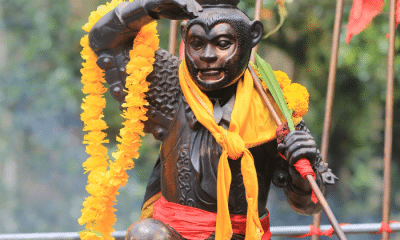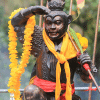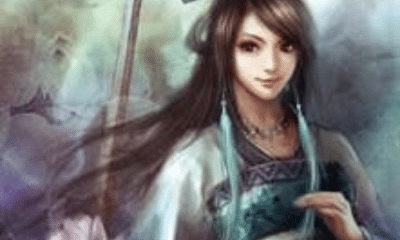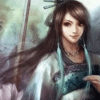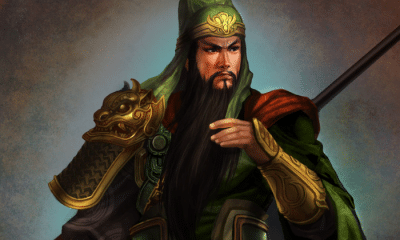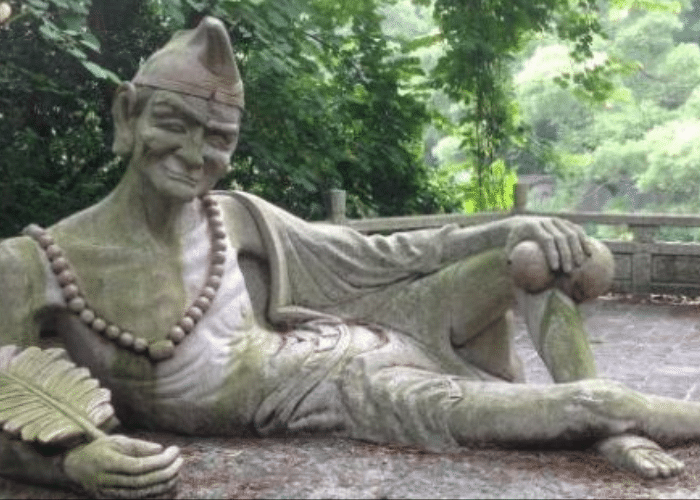
Chinese
Ji Gong: The Rogue Monk
Ji Gong: The Rogue Monk
If you thought all monks were sombre and quiet, think again! Ji Gong is infamous for the rules he broke while doing good works!
Buddhist monks are typically seen as quiet, reserved men. They vow to lead lives of abstinence and poverty to devote themselves fully to helping others and studying the Buddha’s teachings.
Within this tradition, however, monks who behaved badly sometimes emerged. As in the Christian monasteries of medieval Europe, stories were told about monks who drank alcohol, ate in excess, and did not follow the rules that governed their orders.
Usually, these monks were seen as negative figures. One such monk, however, emerged as a cultural hero and god-like being in Chinese folklore.
Ji Gong is sometimes called China’s mad monk. Known for his love of wine, he was expelled from his monastery for not living up to the ideals of his order.
Unlike other renegade monks however, Ji Gona was otherwise characterized as an exceptionally good person. His commitment to helping others made him so well-loved that he was accepted as a holy figure throughout China.
The Unholy Behavior of Ji Gong
Chinese historians place the birth of Ji Gong in the year 1130. He was born with the name Li Xiuyuan.
Li Xiuyuan was the son of Li Maochun, a military advisor. He spent his childhood enjoying a degree of comfort as a member of a respected family in Zhejiang Province.
His parents died when he was just eighteen years old, however. Rather than inheriting their position and wealth, he was sent to live a quiet life in a Chan Buddhist monastery.
Renamed Daoji, he did not adapt well to life in Lingyin Temple. He chafed under the strict rules governing monastic behavior and found it difficult to adapt to the ascetic lifestyle expected of him.
Although he studied under one of the era’s most revered teachers, Daoji soon earned a reputation as a poor student. He openly broke the rules of his monastery by eating meat, drinking wine, and speaking out of turn.
Despite this, however, Daoji still embodied many of the teachings of the Buddha. While he disobeyed many rules of behavior, he was a kind and charitable man.
According to some stories, Daoji left the monastery of his own accord because he could not obey their strict rules. Other legends, however, say that he was expelled as a result of his behavior.
Li Gong set out on his own to help people more directly than had been able to in the temple. He wandered from place to place, helping those in need as he found them.
His travels did not make him appear any more holy to those who saw him. In addition to his frequent inebriation, he also wore clothes that were tattered and dirty from his vagabond lifestyle.
Despite this, he earned the respect and love of those he ministered to. Stories began to spread that he was the reincarnation of a bodhisattva and had supernatural powers of his own.
Some identified him as an arhat, a person who has achieved enlightenment and earned a place in nirvana. He was believed to be an incarnation of the Taming Dragon Arhat, one of eighteen such enlightened individuals in China.
Sources claim that Ji Gong’s last stay was at Jingci Temple, where he died in May of 1209. He was buried beneath a waterfall near Hangzhou.
Soon after his death, Ji Gong was adopted into Taoist beliefs as a deity. They claimed that he followed the teachings of Laozi to become a compassionate and enlightened man.
Some Buddhists, meanwhile, began to claim that Ji Gong could communicate through spirit writing. By forming a telepathic link with the writer, he passed on messages from beyond the grave.
These messages generally took a moralistic tone. Even after death, Ji Gong was believed to preach the same compassion and charity that he had practiced in life.
My Modern Interpretation
It is unsurprising that Ji Gong has become a well-known figure in modern pop culture. While he is seen as worthy of reverence, he is still a comical character who appeals to modern ideas.
Images of Ji Gong emphasize the ways in which he did not fit the traditional model of a Buddhist monk. Wearing torn clothing, he generally holds a bottle of wine or drinking gourd in one hand and is frequently so inebriated that he holds one of his shoes in the other.
In modern cinema and literature, Ji Gong has often been portrayed as an uncouth drunkard to stumbles more than he walks. Despite this, however, he is a sympathetic and even heroic character.
Ji Gong is always shown with a cheerful, carefree expression on his face. While this is at least partially a reflection of his alcohol consumption, it also shows the peace and joy he found as a follower of the Buddha.
Perhaps the best lesson to be learned from the character of Ji Gong is that a person’s appearance is not always a reflection of their worth.
In one of his most well-known stories, for example, Ji Gong happened upon a wedding party as he came into a small village. His ability to see the future, however, meant that he knew tragedy was about to strike the happy scene.
He tried to warn the villagers but no one was willing to listen. Believing him to be nothing more than a drunk traveler, they continued to celebrate the wedding despite his pleas.
Finally, Ji Gong gave up on trying to convince the close-minded people to listen to his warnings. He ran into the middle of the wedding party, threw the bride over his shoulder, and began to sprint out of town.
The entire village followed him, anxious to stop the drunken outsider from harming the young bride in any way.
Their chase was interrupted, however, when they heard a rumble from behind them. The people of the town watched in horror as a sudden landslide buried most of the village.
By stealing away the bride, Ji Gong had been assumed to be committing a crime. In fact, he was leading the villagers away from danger and likely saved many lives.
Even his fellow monks had initially judged Ji Gong harshly because he did not follow all the rules of the temple. In the end, however, he was every bit as devoted as they were to the teaching of the Buddha.
The comedic figure of Ji Gong serves as a reminder that even the most humble people have the capacity to do great good.
In Summary
According to legend, Ji Gong was born into a relatively wealthy and influential family during the Song Dynasty. He was sent to a monastery after his parents’ deaths to devote his life to the study of the Buddha’s words.
While he embraced the virtues of charity, compassion, and service, Ji Gung was much less welcoming of the strict rules of monastic life. He was known for drinking wine, sometimes to excess, eating meat, and breaking many other minor rules.
He was eventually expelled from his order for this behavior. He decided, however, to devote his life to the Buddha as a wandering teacher. He traveled for decades, helping those in need whenever he saw them.
Even in his own lifetime, people saw Ji Gong’s good works as symbols of divinity. He was believed to be the reincarnation of a holy figure who had achieved, so would soon achieve, full enlightenment.
After his death, Taoists adopted Ji Gong as well. His belief in kindness and charity were as valued in their religion as it was to the Buddhists.
The smiling, drunken figure of Ju Gong shows that divinity can come in unexpected forms and that even the most humble person can embody the Buddha’s values. He remains a popular cultural figure for blending traditional values and a rebellious, light-heated attitude.


